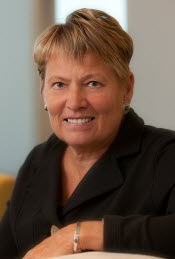State official: Adults have let children down
Susan Broman is director of the state’s Office of Great Start, an office created in 2011 by Gov. Rick Snyder to consolidate the state’s early childhood education efforts. Broman recently responded to written questions posed by Bridge regarding the state’s Great Start Readiness Program, and the 30,000 eligible 4-year-olds who aren’t in classrooms.
Bridge: Our analysis indicates that almost 30,000 children who are eligible for GSRP aren’t enrolled in any state- or federally funded preschool program. Why aren’t more children in class?
 A: There is not enough federal or state funding to serve all children who meet income eligibility guidelines. We simply do not invest enough to ensure there is enough space to serve all eligible children in Michigan.
A: There is not enough federal or state funding to serve all children who meet income eligibility guidelines. We simply do not invest enough to ensure there is enough space to serve all eligible children in Michigan.
Bridge: State funding of GSRP has been practically flat for more than a decade. Isn’t that an indication that state leaders don’t consider preschool a priority?
A: An unchanged funding level for preschool actually demonstrates legislative support over the past several years. Funds for preschool were maintained during a long recession while cuts were made to many other important programs.This is an indication of legislators’ commitment to the value of providing preschool to our most at risk and vulnerable children.
Bridge: In many communities, kids who qualify for free preschool can’t enroll because classes are full. There are long waiting lists at some schools. Given an opportunity, what would you say to those children, and what would you say to Legislators about those children?
A: To the children of our state, I would say that we adults must do better and make sure that all eligible children have an opportunity to participate in a quality preschool experience so that they can enter kindergarten ready to succeed in life and in school. To the legislators, I would point out the numerous national and state studies that document the incredible opportunity we have to make a real impact by investing in early childhood programs. If Michigan children are ever to effectively compete in a global economy and if we aspire to support the development of children with skills needed for 21st century careers, we must bring to scale quality preschool opportunities for all eligible children. The numbers are astounding: at least 40 percent of all Michigan 4-year-olds now eligible for GSRP are not enrolled. Research consistently demonstrates that high quality preschool results in significantly improved school readiness and grade school reading and math proficiency. We may never achieve Gov. Snyder’s metric of having all kids proficient in reading by third grade without increasing access to a quality preschool experience for all children.
Bridge: Is the argument for state-funded preschool for low- and moderate-income families based on public good, or economics?
A: Serving both the public good and economics provide a solid reason for investing in preschool. If we support low-income, at-risk young children with publicly funded preschool, we begin to level the playing field and equalize opportunity. We can build a connector between the culture of poverty and the culture of opportunity with quality early learning experiences. On the side of economic benefits, we can point to the fact we will not be paying for academic remediation at the same level. Does it make more sense to pay for children to repeat kindergarten or first grade, or to invest in preschool so they are ready when they enter kindergarten? There is evidence to support this discussion.
The state-supported GSRP has been in existence for over 25 years. A longitudinal study comparing GSRP participants with nonparticipants demonstrated that children with GSRP experience were retained less often and graduated sooner. The children studied in both groups had comparable characteristics. Other research tells us that for every $1 invested in preschool saves from $3 to $17 in other costs such as welfare, criminal justice, special education and other social expenses. Both the public good and the economic benefit are served when our children grow up to be productive citizens, contributing to the tax base rather than consuming/costing our publicly-funded social safety nets.
Bridge: Some states fund preschool for 4-year-olds, some do not. Why should Michigan?
A: We need to abandon the notion that learning begins at age 5 when children enter kindergarten. Learning begins at birth and a quality preschool opportunity, especially for children living in poverty, supports the early brain development so critical to success in life and in school. Right now, the performance of Michigan children, when compared to children in other states, is lagging. We need to shift public policy and funding to align with what we know from brain research about the importance of early childhood and the benefits of preschool.
Michigan Education Watch
Michigan Education Watch is made possible by generous financial support from:
Subscribe to Michigan Health Watch
See what new members are saying about why they donated to Bridge Michigan:
- “In order for this information to be accurate and unbiased it must be underwritten by its readers, not by special interests.” - Larry S.
- “Not many other media sources report on the topics Bridge does.” - Susan B.
- “Your journalism is outstanding and rare these days.” - Mark S.
If you want to ensure the future of nonpartisan, nonprofit Michigan journalism, please become a member today. You, too, will be asked why you donated and maybe we'll feature your quote next time!



